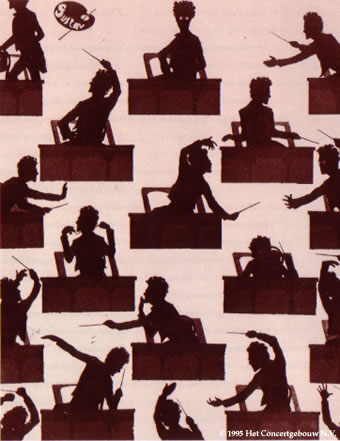Hello All,
I had a question on my mind and this forum seemed the most appropriate to ask it.
I am an avid listener of classical works, I am moved by this sort of music, so I do expect performers and orchestra conductors be moved by their music too.
However it feels like conductors are becoming more and more "silly" with their behavior on stage. I do not get much opportunities to go to concerts, I am more into records but i go to concerts or watch them online as I get the opportunity.
I know that people perceived Karajan as a "show off", and it possibly was the case, he had a huge ego and all that, but I really enjoy his recordings and from the videos I have he looks more solemn than silly.
When I look at Bernstein however, or Simon Rattle with the Berlin Philharmonic, and many many contemporary conductors here and there I cannot refrain myself from disappointment. Exaggerated gestures, silly faces, jumping around and all that, can I convey what I mean? This also holds true for certain virtuoso players.
I refuse to believe that these result from feeling one with the music, one with the composer, or being moved by the music, this is something else, this is more like acting and a meaningless stupid one at that. Classical music after all, especially larger works has a certain structure, certain passages built up to other passages, there are climaxes, mood changes, surprises and all that, however one does not encounter these at every single measure, not every single measure conveys an "extreme" and that is the beauty of it, otherwise the sudden mood change in Schubert's 8 mvmnt 2, or Mozart's 39th Symphony, climaxes in Beethoven etc. would lose its meaning.
Acting too extreme at every second of the piece cannot be a result of the piece itself, it is simply acting, in my opinion it takes away from the performance and from the work being performed.
I do not understand why they resort to such behavior, and I would appreciate any meaningful explanation for this.
Thank You.
I had a question on my mind and this forum seemed the most appropriate to ask it.
I am an avid listener of classical works, I am moved by this sort of music, so I do expect performers and orchestra conductors be moved by their music too.
However it feels like conductors are becoming more and more "silly" with their behavior on stage. I do not get much opportunities to go to concerts, I am more into records but i go to concerts or watch them online as I get the opportunity.
I know that people perceived Karajan as a "show off", and it possibly was the case, he had a huge ego and all that, but I really enjoy his recordings and from the videos I have he looks more solemn than silly.
When I look at Bernstein however, or Simon Rattle with the Berlin Philharmonic, and many many contemporary conductors here and there I cannot refrain myself from disappointment. Exaggerated gestures, silly faces, jumping around and all that, can I convey what I mean? This also holds true for certain virtuoso players.
I refuse to believe that these result from feeling one with the music, one with the composer, or being moved by the music, this is something else, this is more like acting and a meaningless stupid one at that. Classical music after all, especially larger works has a certain structure, certain passages built up to other passages, there are climaxes, mood changes, surprises and all that, however one does not encounter these at every single measure, not every single measure conveys an "extreme" and that is the beauty of it, otherwise the sudden mood change in Schubert's 8 mvmnt 2, or Mozart's 39th Symphony, climaxes in Beethoven etc. would lose its meaning.
Acting too extreme at every second of the piece cannot be a result of the piece itself, it is simply acting, in my opinion it takes away from the performance and from the work being performed.
I do not understand why they resort to such behavior, and I would appreciate any meaningful explanation for this.
Thank You.









